September wildflowers, water, and books
by Diana Studer
- gardening for biodiversity
in Cape Town, South Africa
Weird to live the
way we used to. Flushing the loo with clean drinking water! The horror - at
home we collect shower and bath water to use again. We are so used to using
each litre thoughtfully - that it was alarming away from Cape Town - also emptying
dams there, but no concern about water use?! Our city is still discharging
raw sewage via marine outfalls along the Atlantic Seaboard. From our False
Bay suburb our sewage goes to Wildevoelvlei
sewage works, where a hiking companion does a monthly bird count. Across
the country most
sewage works sadly have huge issues, failing infrastructure, and heavy
pollution of rivers.
Hiking among
wildflowers
in the mountains
around Cape Town
His hike on Karbonkelberg above Hout Bay, looking across to
Chapman's Peak and Long Beach at Noordhoek.
August rain was lovely. September was half the long term
average. October bounced back. At the end of the hydrological year our dams are
at 84%, heading down till autumn rain in May. Every
Monday we get a report for the previous week. Back to loadshedding,
as urgent or planned maintenance cuts power supply. Our photovoltaic panel
installation awaits municipal approval ...
My September hike along the Red
Track (map) at Cape Point (a gentle 5 kilometres),
looking at Wolfkop.
Vibrant blue Aristea
africana. Trachyandra hirsutiflora.
Orange and greys in lichen.
Yellow Geissorhiza
humilis after fire.
Watsonia coccinea,
violet anthers, spotted blister beetle (don't touch - cantharadin!)
Syncarpha speciosissima
with a yellow heart.
Osteospermum polygaloides
yellow daisies with their distinguishing leaves.
Monkey beetles on creeping Arctotis angustifolia.
Crassula glomerata
red fuzz on sand. Purple Senecio elegans
where we check the involucral bracts.
Yellow with a green central ring Ursinea paleacea. Furry white bracts with minute
purple flowers Petalacte coronata
After a few days changing from yellow or white to pink, this
crab / flower spider was still there for a photo when we circled back from our
walk. Lachnaea densiflora in cream
and pink.
BLUE Wahlenbergia
capensis. Polygala bracteolata
with white tassel.
Golden stars for Christmas Ficinia
radiata. Aspalathus juniperina
pea flower.
Yellow and white Sebaea
aurea with keeled calyx lobes gentian family
Bladderwort eats insects in damp places, tiny Utricularia bisquamata. Tall yellow Gnidia oppositifolia along streams.
Adenandra villosa.
Clustered velvety flowers Serruria
glomerata
Mountain zebra with white bellies eyeing us from the ridge.
3 Jeffrey Eugenides
- The marriage plot
Sigh. I read 70 pages, skipped to the last chapter, then
skim read a random sentence. I will try his - Middlesex.
2 Fiona Snyckers
- Now following you
This is South Africa, a blogger, and contemporary. It fascinates
me to see my here and now through other, much younger and rainbow people, eyes.
1 Patrick Gale - A place called winter
In September I did a digital detox during the 3 weeks we were on the road. I took 7 books, then read the best one again. Early Canadian settlers, pioneer life. Social attitudes have changed so much since Oscar Wilde's trial. Every character in this book (even the evil unsympathetic ones) is vivid and three dimensional.
We met some interesting people on the way. On the train home
a couple from Texas Hill Country (like Rock
Oak Deer blog in San Antonio) Their business is large rain tanks. We have
drought, and how to live with rain tanks in common. At Magoebaskloof the couple at the next table were going to a
bush wedding (the bride's mother wore little pink wellies) Both geologists at
Witwatersrand University studying lithium mining. And we have an electric car
...
I invite you to join us at Elephant's Eye on False Bay.
Please subscribe as you prefer
via Feedly,
or Bloglovin,
Teal blue text is my links.
To read comments if you are in email or a Reader,
first click
thru to the blog)
Thanks for comments that add value. Maybe start a new thread
of discussion? BTW your comment won't appear until I've read it. No Google
account? Just use Anonymous, but do leave a link to your own blog. I would
return the visit, if I could...
I welcome comments on posts from the last 2 months.
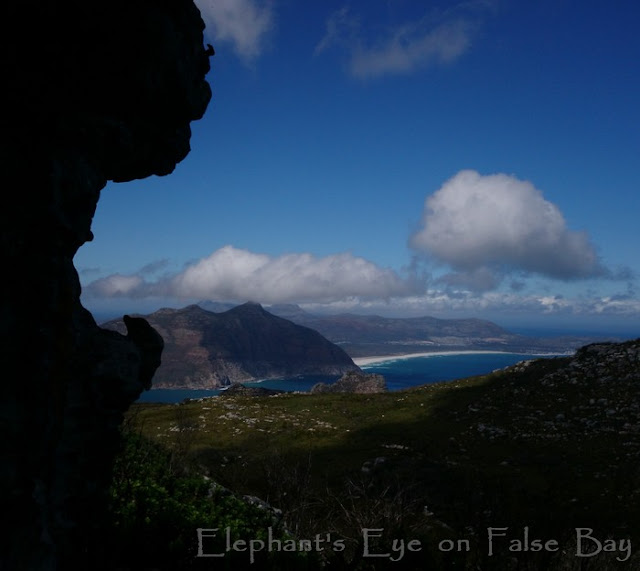

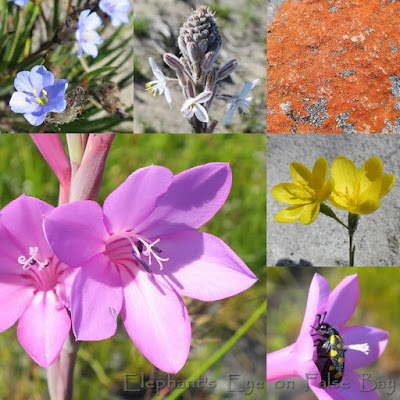
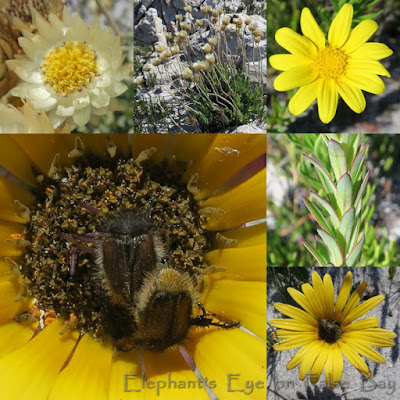


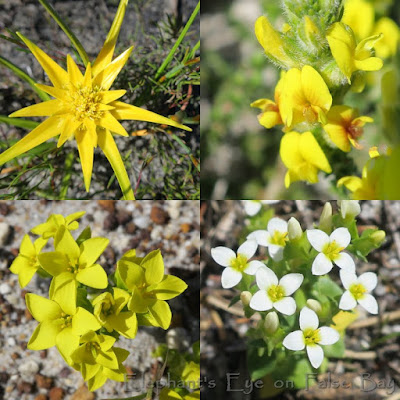


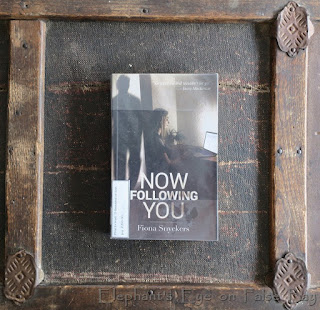

You have the most beautiful wildflowers, and how amazing to see zebras while you are walking. We certainly take our supposedly endless supply of natural resources for granted until we no longer have them. Laura.
ReplyDeleteLovely flower shots as always. I was intrigued by the Wahlenbergia. I grow one variety (labeled simply as Wahlenbergia species by the grower) but it isn't nearly as interesting as the W. capensis you photographed. I'm glad you've received decent rainfall overall. We're still waiting to see what kind of precipitation we can expect during this rainy season - thus far the answer has been none! Our state lifted most water restrictions last year, after a single year of heavier-than-normal rain (and despite the truly pathetic rainfall in the year prior to that). I consider that exceptionally foolish.
ReplyDeleteOn today's hike the pretty blue was next to a quiet white W. tenella - didn't look remotely related. Waiting and wondering what will happen to our water restrictions next.
DeleteAs always, you post images of fascinating wildflowers, most of which are unfamiliar to me. Your shot of the Monkey beetles is great! Are these beetles considered good guys or bad guys?
ReplyDeletePollinators like honey bees, who eat pollen - and cute too!
DeleteThis year I was so distressed about the drought with no rain for month, I seriously considered a water collection system for used water from the shower and the washing mashine. But where can we put the water tank?
ReplyDeleteWashing machine water (if you choose a suitable detergent) can be run onto the lawn.
DeleteWe have a smallish 'tank' with a lid about 80 litres - and that I can use with a watering can for strategic plants. Big budget option would be a buried tank and a pump for an irrigation system. Grey water should be used within 24 hours - but mine lasts a few days.
Mountain Zebras, now that is exciting. We get both excited and horrified if we see a rabbit in the garden.
ReplyDeleteThe pink spider perfectly color coordinates with the flower. Pretty. P. x
ReplyDelete